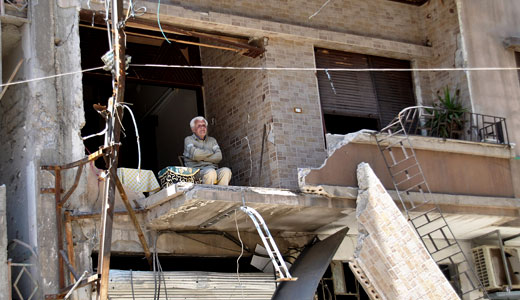
This past week, French President Francois Hollande and British Prime Minister David Cameron announced that their governments would push for an end to the European Union embargo on selling weapons to rebel forces in Syria. However, they have not been able, so far, to persuade either the other European Union nations or the United States to join them in taking the plunge.
It is not as if the European countries and the U.S. were not already intervening with financial help channeled through the gulf monarchies and Saudi Arabia. Before she left the State Department, Hillary Clinton did yeoman work in organizing support for the rebels, through her creation “the Friends of Syria” and other means. At the most recent “Friends of Syria”, on February 28, U.S. Secretary of State John Kerry announced that the U.S. will be sending more “non-lethal aid” to the rebels.
But the issue of giving advanced weapons directly to the rebels has been one from which the NATO powers have so far held back. Such a move would have strong diplomatic repercussions and, moreover, there is still a fear that in the end, the weapons would end up in the hands of the Al Nusra Front, extremist Islamic militants with Al Qaeda links.
The argument that has been pushed by those seeking to arm the rebels is that if this were not done, non-extremist elements in the rebel coalition would be in danger of being defeated by the Islamists in the race to replace the government of Bashir Al Assad, and the position of Al Qaeda in the entire region would be enhanced. However, to determine where the weapons end up or what impact their provision would have not only on Syria but on the whole of the Middle East and the Islamic world is a difficult piece of clairvoyance.
The roughly similar situation in Libya, with NATO’s intervention to overthrow Gadaffi, has not left a stable, peaceful region in its wake. Rather, it has unsettled the whole of North and West Africa. A similar situation may be developing in Mali, where French troops intervened earlier this year and, along with Malian troops and contingents from other African states, are still battling Islamist rebels who move back and forth across the porous borders of the Sahel region.
The destabilizing influence of the Syrian conflict is used by both proponents and opponents of giving arms to the rebels to bolster their arguments. Those in favor claim it is necessary to prevent the Islamists to take over the leadership of the rebel coalition. Those against question whether outsiders providing arms to the rebels can really determine, once the arms are handed over, in whose hands they will eventually end up.
This state of affairs is already threatening neighboring Lebanon with more sectarian conflict, and the refugee situation is out of control in Lebanon, Jordan, Iraq and other neighboring countries.
In France, the proposal to arm the rebels generated an immediate negative response from the left. Jean-Luc Melenchon, leader of the Left Front and the left’s candidate for president in 2012, called the proposal an “absolute mistake” and compared it to sticking one’s finger into a terrifying set of gears. “Wasn’t the Libyan experience enough for us? …There is no other exit for the crisis than negotiations and politics.”
The intervention in Syria and aid to the rebels are supported by Turkey, Saudi Arabia, Qatar, and other monarchies that are themselves hardly examples of democratic government and respect for human rights. There is evidence that militant Islamist groups from as far away as Russia have been travelling to Syria to join the rebel ranks.
Opposition to support for the rebels has come from Russia, China, Iran, Iraq, and most left-wing forces in and out of power worldwide. Russia has been taking the lead in denouncing outside intervention and calling for a negotiated settlement. Syrian communists have been critical of Assad but especially vocal in denouncing outside intervention. Here in the United States, the Communist Party of the USA (CPUSA) and others on the left have also been calling for a negotiated settlement and an end to outside intervention.
At writing, most other European Union states, including, crucially, Germany, still seemed reluctant to end the arms embargo. British Foreign Minister William Hague suggested that Britain and France might have to go it alone if the EU does not change its position.
A Syrian man sits on the balcony of his destroyed house. AP












Comments